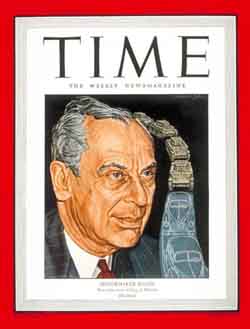 Alfred Pritchard Sloan,
Jr. (1875-1966)
Alfred Pritchard Sloan,
Jr. (1875-1966) Alfred Pritchard Sloan,
Jr. (1875-1966)
Alfred Pritchard Sloan,
Jr. (1875-1966)
By Richard Sanders, Editor, Press for Conversion!
Sloan was a member, Advisory Council of the American Liberty League.
Son of a coffee and tea importer, Alfred Sloan, became America’s first great corporate celebrity. His greatest contributions to his class included the destruction of mass transit, the crushing of labour strikes at du Pont's General Motors (GM), arming Hitler before and during WWII and promoting President Wilson’s slogan that “What’s good for General Motors is good for the U.S.” (That’s GM president Charles Wilson, 1941-1953).
Armed with an MIT electrical engineering degree in 1895, Sloan was a machine shop president in 1899. His company merged with two others to form GM in 1918. Sloan was vice-president and then president (1923) and GM’s chairman (1937-1956). Under Sloan’s leadership, GM systematically bought up and destroyed America’s highly-efficient electric train, streetcar and tram infrastructure, and literally burnt the vehicles. Knowing the public preferred streetcars over fume-belching buses, GM bought up America’s largest bus operator (Omnibus) and largest bus manufacturer (Yellow Coach). Manhattan was their symbolic starting point. GM acquired controlling interest in its rail system and then dismantled it (1926-1936). Bus services were decreased and mass PR campaigns were launched selling the notion that what people really wanted was cars. Thus, Sloan “motorized” America for GM.
Sloan unceasingly propagated the myth that corporations are central to public happiness and prosperity. This helped cover up the fact that corporations will quickly sacrifice public interest in their selfish drive towards greater profits. David Farber, author of Sloan Rules: Alfred P. Sloan and the Triumph of General Motors (2002) said:
"There’s a lot I don’t like about Mr. Sloan. His steady opposition to making safer automobiles, his dismissal of workers’ rights, his inability to see Adolf Hitler as evil and dangerous..., and his general disregard for social justice and the common good make him a not very lovable figure. Those failings are usually not weaknesses in a corporate manager, even as they make Sloan less than a model of good citizenship. But good citizenship has little to do with maximizing corporate profits. Which makes it pretty obvious to me that putting corporate leaders in charge of our public good is ill-advised."
Farber also notes that GM destroyed Sloan’s files to protect itself from lawsuits regarding antitrust issues, the neglect of automobile safety and its investments in Nazi Germany.
The Alfred P. Sloan Foundation, established in 1934, had assets worth over $1.3 billion in 2002.
GM is the world’s largest company. With operations in 104 countries and sales of $125 billion a year, GMs revenues are the equivalent of the world’s 6th largest country.
References:
Jill Rapaport and Scott Butek, General Motors and You: An Appreciation
of James Klein and Martha Olson's "Taken for a Ride"
Google cache: http://www.interactivist.net/transportation/ride.html
An interview with David Farber, author of Sloan Rules: Alfred
P. Sloan and the Triumph of General Motors, 2002.
http://www.press.uchicago.edu/Misc/Chicago/238040in.html
Source: Press for Conversion! magazine, Issue # 53, "Facing the Corporate Roots of American Fascism," March 2004. Published by the Coalition to Oppose the Arms Trade.
Order a Copy: Order a hard copy of this 54-page issue of Press for Conversion! on the fascist plot to overthrow President F.D.Roosevelt and the corporate leaders who planned and financed this failed coup.